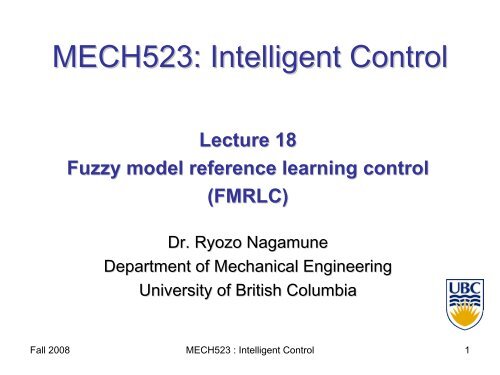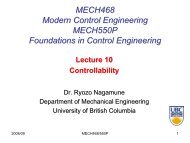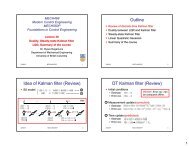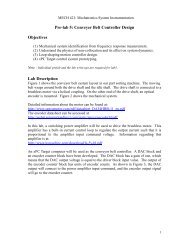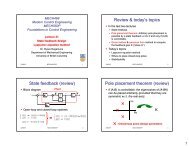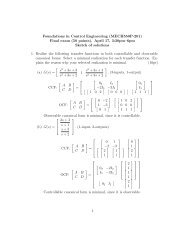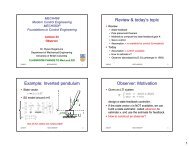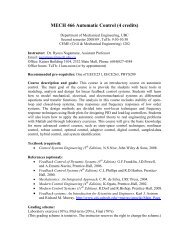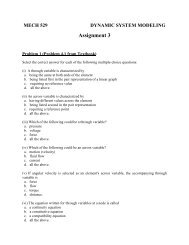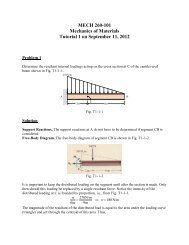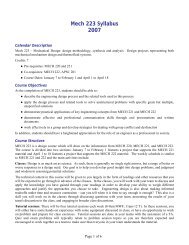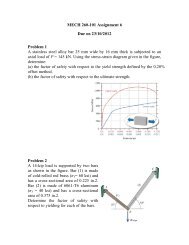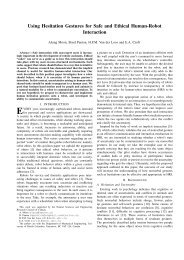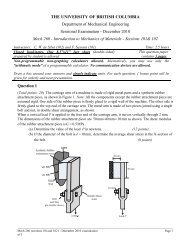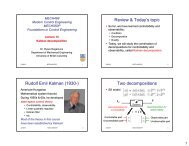pdf (slide per page) - UBC Mechanical Engineering - University of ...
pdf (slide per page) - UBC Mechanical Engineering - University of ...
pdf (slide per page) - UBC Mechanical Engineering - University of ...
You also want an ePaper? Increase the reach of your titles
YUMPU automatically turns print PDFs into web optimized ePapers that Google loves.
MECH523: Intelligent Control<br />
Lecture 18<br />
Fuzzy model reference learning control<br />
(FMRLC)<br />
Dr. Ryozo Nagamune<br />
Department <strong>of</strong> <strong>Mechanical</strong> <strong>Engineering</strong><br />
<strong>University</strong> <strong>of</strong> British Columbia<br />
Fall 2008 MECH523 : Intelligent Control 1
Review<br />
• Fuzzy controller design methods<br />
• Construction <strong>of</strong> rules via heuristic information<br />
• Fuzzy identification via numerical I/O data<br />
Fuzzy controller<br />
r(t)<br />
Fuzzification<br />
Inference<br />
mechanism<br />
Rule-base<br />
Defuzzification<br />
u(t)<br />
Plant<br />
y(t)<br />
Fall 2008 MECH523 : Intelligent Control 2
Issues in fuzzy controllers<br />
• Hard to choose some controller parameters (e.g.<br />
in membership functions and rule-base) to meet<br />
specified <strong>per</strong>formance.<br />
• How to automatically synthesize the initial fuzzy<br />
controller for the nominal condition?<br />
• The fuzzy controller designed for a nominal plant<br />
may <strong>per</strong>form inadequately if plant parameters<br />
vary, or if some condition (noise, disturbance,<br />
environment) changes significantly.<br />
• How to automatically tune the fuzzy controller so that<br />
it can adapt to different plant conditions?<br />
Fall 2008 MECH523 : Intelligent Control 3
Direct and indirect adaptive control<br />
• Direct adaptive control<br />
(Sections 6.2-6.5)<br />
6.5)<br />
• Indirect adaptive control<br />
(Section 6.6)<br />
Plant parameters<br />
Adaptation<br />
mechanism<br />
Controller<br />
designer<br />
System ID<br />
Controller parameters<br />
Controller<br />
Plant<br />
Controller<br />
Plant<br />
Fall 2008 MECH523 : Intelligent Control 4
Fuzzy model reference learning<br />
control (FMRLC)<br />
• Direct model reference adaptive controller<br />
• FMRLC will tune controller parameters, and will<br />
memorize to some extent the parameter values<br />
that it had tuned in the past.<br />
• On the contrary, many conventional adaptive<br />
control techniques<br />
• would not have such memorizing scheme,<br />
• and have to retune each time a new o<strong>per</strong>ating<br />
condition is encountered.<br />
• Note the difference <strong>of</strong> “learning” and “adaptive”.<br />
Fall 2008 MECH523 : Intelligent Control 5
Block diagram <strong>of</strong> FMRLC<br />
Reference<br />
model<br />
Knowledge-base<br />
modifier<br />
Learning mechanism<br />
Fuzzy inverse model<br />
Plant<br />
Fuzzy controller<br />
Fall 2008 MECH523 : Intelligent Control 6
Fuzzy controller<br />
• PD fuzzy controller with inputs<br />
• Error<br />
• Change-in<br />
in-error<br />
• Scaling gains ge, gc, gu<br />
• Rule-base<br />
• Ex: If error is PL and change-in<br />
in-error is NS<br />
then plant input is PL.<br />
• MF<br />
Fall 2008 MECH523 : Intelligent Control 7
Fuzzy controller (cont’d)<br />
• FMRLC will automatically synthesize or tune<br />
output MFs. . (Input MFs are fixed.)<br />
• Initialization is necessary for output MFs. . Make a<br />
best guess, or just choose the triangular ones.<br />
• Method selections<br />
• Fuzzification: : singleton fuzzification<br />
• Premise “and”:: minimum or product<br />
• Implication: minimum or product<br />
• Defuzzification: : COG method, center average method<br />
Fall 2008 MECH523 : Intelligent Control 8
Reference model<br />
• Reference model characterizes design criteria:<br />
• Rise time<br />
• Overshoot, etc.<br />
• Example<br />
Discrete-time<br />
time<br />
implementation<br />
Discretization<br />
Fall 2008 MECH523 : Intelligent Control 9
Performance evaluation<br />
• Desired <strong>per</strong>formance <strong>of</strong> the closed-loop loop system<br />
is achieved if the error signal<br />
remains very small for all time no matter what<br />
• reference signal is.<br />
• plant parameter variations occur.<br />
• Error signal<br />
• Small Learning mechanism will not make<br />
significant modifications to the fuzzy controller.<br />
• Large Learning mechanism will adjust FC.<br />
Fall 2008 MECH523 : Intelligent Control 10
Learning mechanism<br />
• Tuning <strong>of</strong> rule-base <strong>of</strong> fuzzy controller s.t. . the<br />
C.L. system behaves like reference model.<br />
• The learning mechanism consists <strong>of</strong>:<br />
• Fuzzy inverse model: : Function to map ye(kT) ) to<br />
changes in the plant input p(kT) ) that are necessary to<br />
force ye(kT) ) to be zero, or small. (next lecture)<br />
• Knowledge-base modifier: : Function to modify fuzzy<br />
controller’s s rule-base to affect the needed changes in<br />
the plant inputs. (following <strong>slide</strong>s)<br />
Fall 2008 MECH523 : Intelligent Control 11
Knowledge-base modifier<br />
Fuzzy<br />
controller<br />
Plant<br />
• If fuzzy controller had generated control input<br />
then ye(kT) would have been zero.<br />
• Next time when we have similar value <strong>of</strong> e and<br />
c, plant input will be u(kT-T)+p(kT<br />
T)+p(kT). ).<br />
Fall 2008 MECH523 : Intelligent Control 12
Modification <strong>of</strong> output MFs<br />
• Example: Assume fuzzy inverse model produced<br />
p(kT)=0.5, for e(kT-T)=0.75,<br />
T)=0.75, c(kT-T)=<br />
T)=-0.2.<br />
Output MF<br />
for R1R<br />
Output MF<br />
for R2R<br />
Fuzzy<br />
controller<br />
Move the corresponding<br />
output MFs by p(kT).<br />
Two rules (R1 & R2)<br />
are active in this case.<br />
Fall 2008 MECH523 : Intelligent Control 13
Some comments<br />
• Local learning: : Only output MFs relevant to<br />
active rules (not entire rule-base!) are modified.<br />
• Local learning is important for memorizing the<br />
changes in the past in fuzzy controllers.<br />
• The controller adapts to new situations and also<br />
memorize how it has adapted past situations.<br />
• Various alternative knowledge-base modifiers to<br />
modify output MFs are presented in Section<br />
6.2.4. Read the section.<br />
Fall 2008 MECH523 : Intelligent Control 14
Summary<br />
• FMRLC: Fuzzy model reference learning control<br />
• Plant<br />
• Fuzzy controller<br />
• Reference model (desired closed-loop loop system)<br />
• Learning mechanism<br />
• Fuzzy inverse model (next lecture)<br />
• Knowledge-base modifier (today’s s lecture)<br />
• Learning mechanism memorizes and tunes<br />
information in fuzzy controllers.<br />
• Read the textbook until <strong>page</strong> 330.<br />
Fall 2008 MECH523 : Intelligent Control 15


